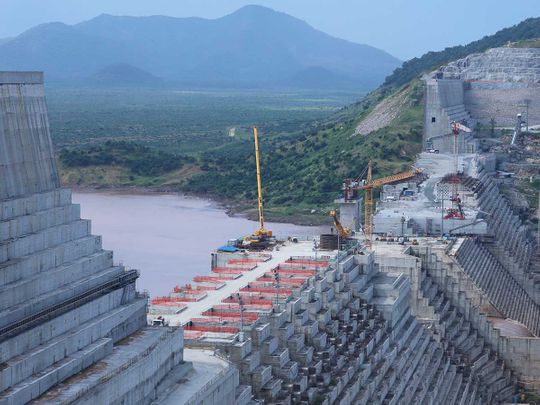
The African Union Commission says that “more than 90 per cent” of the issues between Egypt, Ethiopia and Sudan, over the filling of the Grand Ethiopia Renaissance Dam (GERD), have been resolved. That is good news, and the three neighbours can build on it to reach a permanent agreement.
The three countries share thousands of years of history and common interests. Their amicable relations over the years helped keep the region stable. Thus, it is necessary to reach a fair and lasting agreement on this critical issue. The dispute over the $5 billion dam, near Ethiopia’s border with Sudan, has been lingering for a decade. The GERD project is considered as Africa’s largest hydroelectric power plant, and Addis Ababa says it is crucial to provide much-needed electricity and boost the economy. The Ethiopian government says the process of filling the dam, which could start in two to three weeks, may take up to seven years.
Egypt believes that when the dam is filled, the already scarce water supplies from the Nile will be restricted further. The largest Arab country, of 102 million people, is almost entirely dependent on Nile water, receiving around 55.5 million cubic metres a year from the river, and says that filling the dam will affect the water it needs for drinking, agriculture and electricity.
The three countries [Ethiopia, Egypt and Sudan] don’t favour escalating the dispute. Therefore, it is necessary to show flexibility on the deadlines to allow for a permanent deal that satisfies the concerns of all of them.
Egypt says the dam is being filled too fast and asked for the reservoir to be filled over 12 to 21 years. Ethiopia declined the request.
The downstream countries, Egypt and Sudan, don’t dispute the right of Ethiopia to expand energy resources. However, it is also important for Addis Ababa to acknowledge the concerns of the downstream countries.
The African Union on Saturday said it has two weeks to help broker a deal to end the dispute. A report on the ongoing negotiations will be issued early next week. With good intentions, a deal can be reached. Although the intervention of the African Union may have been late, it still is a good move.
The UN Security Council is due to discuss the issue on Monday, as per Cairo’s request. Egypt seeks an amicable settlement. The three countries don’t favour escalating the dispute. Therefore, it is necessary to show flexibility on the deadlines to allow for a permanent deal that satisfies the concerns of all of them
The dispute will affect the livelihood of millions of people. An amicable and fair deal is worth the wait.







